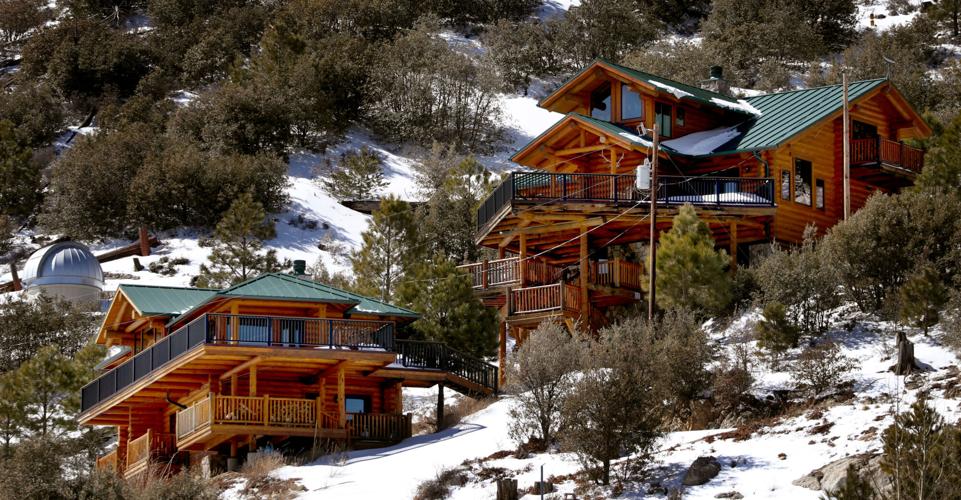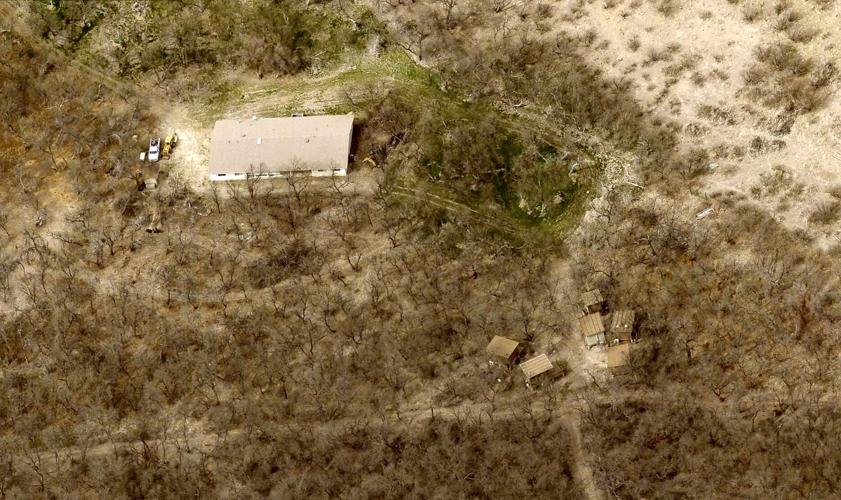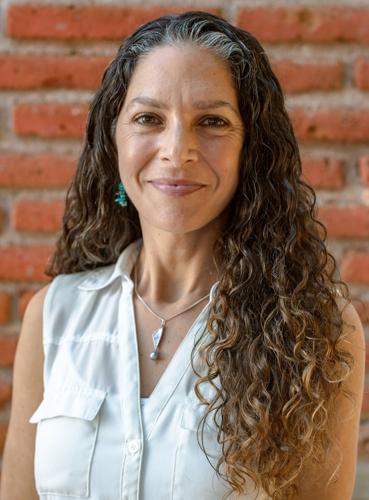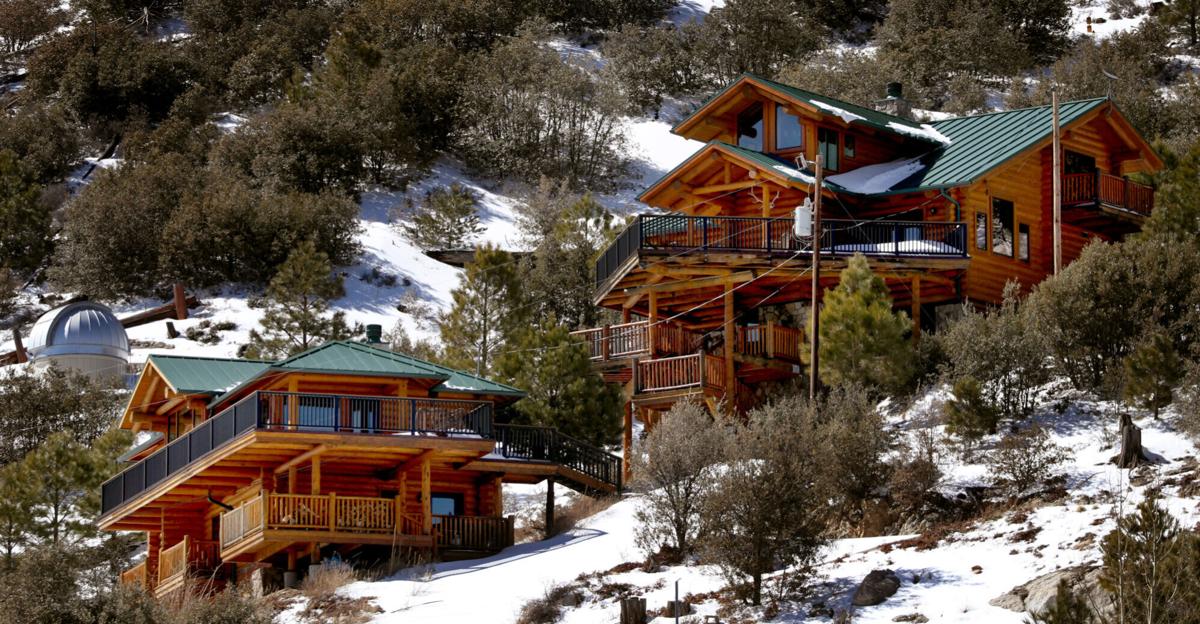A Tucson church that recruits on the University of Arizona campus and is described as a cult by dozens of former members has purchased 14 adjacent properties on Southern Arizona’s highest mountaintop in cash transactions not disclosed to the congregation, according to six people who recently left.
Public records show Tucson Faith Christian Church Inc. amassed the land in Summerhaven on Mount Lemmon between 2000 and 2022. Church leaders have registered a homeowners association named after a nearby street, a sign of intent to develop the area, an Arizona Daily Star investigation found.
Most of the church land is vacant, with current zoning that only allows construction of single-family homes, according to Pima County’s zoning department.
Even so, a document the church HOA filed in 2018 with the Arizona Corporation Commission identified “hotel/motel” as one of the uses that best describes “the character of business of your corporation.”
Faith Christian does not own a house of worship and holds Sunday services in rented hotel meeting rooms. The church also meets weekly on the UA campus despite years of complaints from alumni who say its practices caused them financial, mental and spiritual harm.
The church has already built two multi-level log homes on its mountain land, both constructed in 2013 with a total cash value of $1.4 million for the 2024 tax year, Pima County Assessor’s Office records show.
But the church pays no property tax on the two dwellings or on four of its other parcels. It applied to Pima County for tax exemptions claiming both houses are “regularly used for church retreats and activities” — a claim disputed by former members.
They say the high-end homes are off-limits to the congregation and only available to pastors, church board members and their families — which, if true, could put Faith Christian in the crosshairs of the Internal Revenue Service, tax experts say.

Faith Christian Church Inc. built these two luxury cabins, photographed after a recent snow. It pays no property tax on the cabins, which former members say are for the use of congregation leaders, after receiving a religious exemption from the Pima County Assessors’ Office.
IRS rules prohibit “inurement” — the use of church assets for the private benefit of select insiders.
Nine Faith Christian officials — four pastors, four members of the board of directors and the church’s top administrator — did not respond to detailed written requests for comment for this story. Requests were made repeatedly over nearly two weeks by phone and in emails to the church’s main address and to the private and work addresses of individual church officers.
Former members said they quit the church or were cast out when they heard about the Mount Lemmon land buys and started asking where the money came from and why it was spent on resort-area properties instead of acquiring a house of worship.
Membership suspended
The National Association of Evangelicals, which promotes financial accountability as a best practice for member churches, recently suspended Faith Christian’s decades-long membership a few days after the Star requested comment about the church.
Association spokeswoman Sarah Kropp Brown said “a number of complaints” have been filed against the church. She would not share details but confirmed they involve issues raised by the Star’s investigation.
Faith Christian was founded in 1990 and still is led by Stephen M. Hall, 70, a self-described former marijuana farmer who says he once was arrested in Florida with “truckloads” of weed. He made the claims in a 2015 sermon at a church service attended by a Star reporter.
Records from Florida’s Miami-Dade County Police Department show Hall was wanted for extortion in Madison, Wisconsin, in 1976. He was picked up in Florida on the Wisconsin warrant but the records do not contain further details. The Star found no record of Hall’s reputed drug arrest.
Rooted in controversy
Hall has no formal pastoring credentials and preaches what critics call a warped version of Christianity: one that involves financial coercion, alienation from family members, subjugation of women and corporal punishment of babies to ostensibly drive out demons that keep them from falling asleep.
Before moving to Tucson, Hall preached for another campus-based church that collapsed amid claims it was cult-like.
Maranatha Christian Ministries, headquartered in Gainesville, Fla., where Hall lived at the time, recruited college students in the U.S. and several other countries before folding in 1990 after years of bad publicity.
A committee of religious leaders who investigated complaints in the 1980s found Maranatha’s authoritarian practices were potentially harmful to college students.
Faith Christian Church’s original name was Maranatha Christian Church of Tucson, Inc., according to name change records Hall filed with the state in 1990.
The Tucson church is a family operation for the Hall clan.
Eleven of the founder’s relatives — his wife, their five grown children and each of the children’s spouses — are listed as a senior pastor, an associate pastor or a campus evangelist on the church’s website.
'Awestruck'
Few church goers have ever seen the Mount Lemmon properties up close, former members say.
John Bierman says he had the chance in 2013 when he helped move contents into Faith Christian’s then-newly-built log homes.
“I was awestruck,” said Bierman, 35, UA Class of 2010, who has a bachelor’s degree in interdisciplinary studies in math, philosophy and education.
Wood floors gleamed in sunlight from walls of tall windows, he recalled. Bathrooms had custom tile work and faucets from which water flowed like waterfalls.
There were fine leather sofas, kitchens fit for a TV chef and an outdoor hot tub with room for eight to 10 people, he said.
“It was like being in a penthouse, like in the nicest hotel,” Bierman said. “Everything was custom, top of the line.”
Until recently, photos of the mountain homes and their contents were publicly available on the website of an architect who worked on the project. The images confirmed some of Bierman’s descriptions before the site went dark a few weeks ago.
'Red flags'
The sheer number of Mount Lemmon properties, plus the alleged limits on usage and alleged secrecy surrounding the land buys, would raise alarm bells for any lawyer familiar with IRS rules for religious organizations, several Arizona attorneys told the Star.
“There’s red flags for all of those things,” said Gerard O’Meara, general counsel for the Roman Catholic Diocese of Tucson and its 78 parishes.
O’Meara said Summerhaven’s location — a 45-mile drive from Tucson that takes about 90 minutes on winding roads — would likely make it hard for a church to hold retreats there on a regular basis. And without regular use, it would be tough to establish a religious justification for such a costly purchase, he said.
Attorney Ellis Carter, founder of Caritas Law Group in Phoenix who specializes in nonprofits and other tax-exempt entities, said restricting the use of church property to only a select few would be “super strange. I’ve never had a case like that.”
“Holding (land) for recreation for a small group of people is absolutely not okay,” Carter said. “Only allowing particular people to participate in the retreats makes it seem that it’s not administered in a way that’s objective and nondiscriminatory. That starts to look like inurement.”
Churches are allowed to have investments such as real estate, Carter said, but investments must be managed to ensure they are reasonable, diversified and of benefit to the organization.

10-acre ranch owned by Faith Christian Church at 14,650 N. San Pedro River Road in Redington, northeast of Tucson.
'Breakdowns in the system'
Carter said proving inurement is difficult and requires an IRS audit, but the federal agency is under-staffed and audit rates are down.
“We’re seeing breakdowns in the system,” she said. “There are a lot of complaints that there’s not enough oversight of nonprofits. But then the IRS has no resources to actually conduct that oversight.”
That could change under the federal Inflation Reduction Act passed last year. The measure provides $80 billion over 10 years to hire more IRS auditors, replace those who retire and improve agency operations, according to the Congressional Budget Office.
Scott Carpenter, a tax attorney who represents churches and nonprofit entities at Carpenter Hazlewood in Phoenix, said if leaders of a church use church property for personal recreation, they would need to prove to an auditor in each case that they reimbursed the church from personal funds for the fair-market cost of renting a similar property in the area.
'Upper Goat Hill Estates'
Faith Christian’s first Mount Lemmon parcel was purchased in 2000, followed by seven more over the next 20 years, for a total of eight by 2020, public records show. The church bought six more lots between 2020 and 2022.
Faith Christian paid cash for each of the 14 properties, public records show. Their combined full cash value is $1.7 million for 2024, county assessment records show.
The church’s HOA, the Upper Goat Hill Estates Homeowners Association, was named after Upper Goat Hill Road in Summerhaven. It was founded in 2007 by the church’s head administrator, Keith A. Jenkins, and three other people who dropped out years ago.
Since 2013, records show, the HOA has been under the exclusive control of Jenkins, senior pastor Hall and executive pastor Ian A. Laks, Hall’s second in command.
‘Kicked out of church'
Andrew Winslow has three UA degrees — a bachelor’s in psychology, a masters and doctorate in rhetoric composition and the teaching of English. He is 43 years old, soft-spoken and works in human resources for Raytheon Technologies.
For years, Winslow says he refused to believe rumors that the church he joined in his freshman year was spending money on vacation homes. When he finally saw photos on Instagram, he said, “I felt like I’d been punched in the stomach.”
Three church officials gave him the runaround when he started asking questions, he said. Each said they weren’t the right person and told him to ask the others.
After months of pestering, Winslow said the church finally handed over two financial overviews for 2019 and 2020, documents that had few details and raised more questions than they answered, he said. Star reporters have reviewed those documents.
For example, the reports said the church received up to $178,000 a year in interest income on $3 million to $4 million in investments but didn’t say where the investments are held and how much money is in each account.
Faith Christian’s total net assets stood at nearly $6.8 million in 2020 and $6.5 million in 2019, the documents said.
The church, which had about 400 members in 2015, now has fewer than 200, including all existing clergy and staff, according to former members.
Winslow said he kept asking questions until Hall, the senior pastor, said he was no longer welcome and told him to leave.
“After 24 years, I was kicked out of church on a Sunday.”
'What are you hiding?'
Other local religious leaders say financial secrecy erodes the trust level between pastors and congregants and is not a sign of a healthy church.
Greg Lavine, co-lead pastor at New Life Bible Fellowship in Tucson, said he has no first-hand knowledge of Faith Christian’s actions and can’t pass judgment on their propriety. But the idea that a church would buy property behind the backs of its members is disturbing, he said.
“When you start to say multiple properties, and the congregation not knowing (the purpose), that makes no sense whatsoever," Lavine said.
Every year New Life Bible Fellowship's congregation votes to approve the church budget, Lavine said. The vote is held during a regular Sunday service to ensure maximum participation of the church’s 1,200 members, he said.
In the weeks leading up to the vote, church leaders issue an explanatory video about the budget and often hold open meetings and question-and-answer sessions, he said.
Lavine said accountability helps ensure a well-functioning church and a healthy relationship between leaders and members.
“Trust is one of the most important relational virtues we have,” Lavine said. “It takes transparency to function with trust.”
Glen Elliott, lead pastor of Pantano Christian Church for 15 years, said congregations should have ready access to details of their church budget and spending.
If not, Elliott said, “the obvious question is, ‘What are you hiding?'"
Nearly two feet of snow fell on Mt. Lemmon after a winter storm closed out 2021. Tucsonans flocked up Catalina Highway on January 3, 2022 to enjoy skiing at Mount Lemmon Ski Valley, sledding and winter fun. Video by: Mamta Popat, Arizona Daily Star







